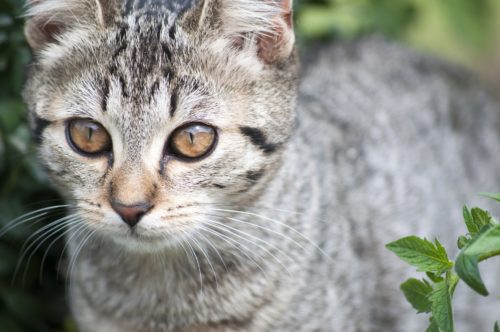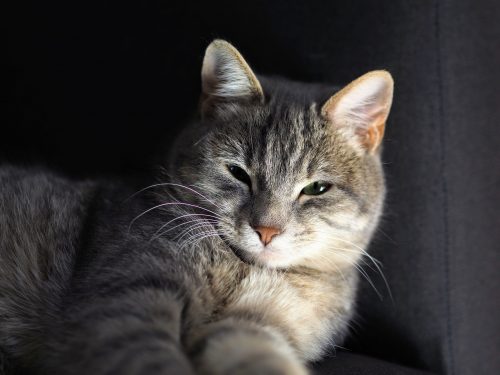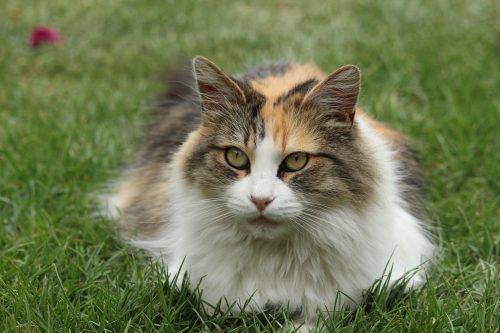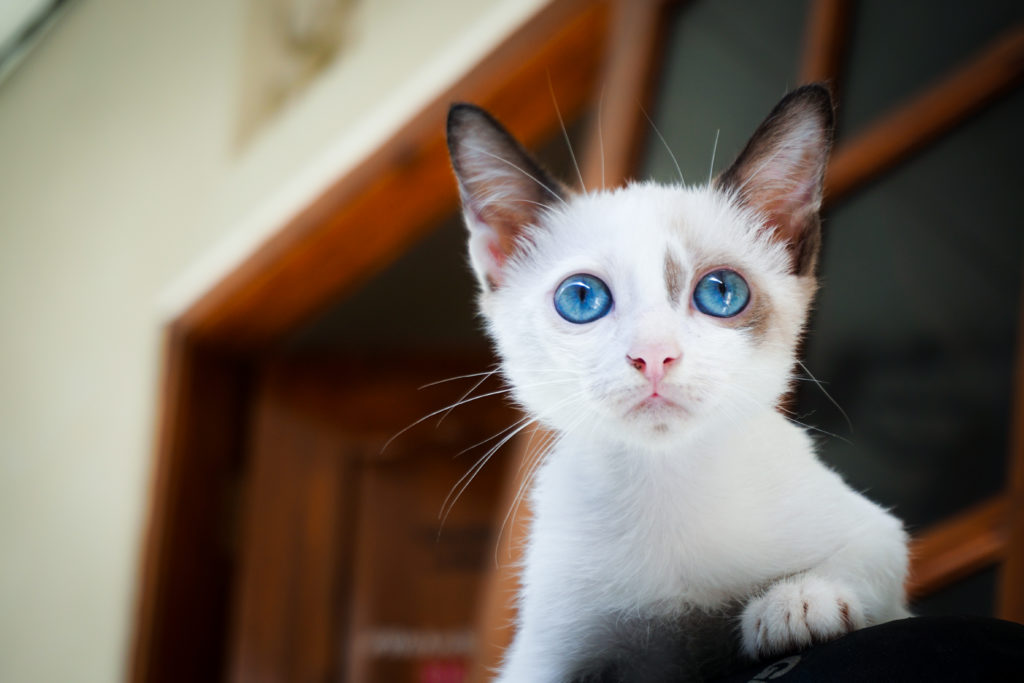Your cat has done it again. You begin to notice that your house is smelling like urine but don’t know where it’s coming from until you catch him in the act. For some odd reason, it seems as though your cat is marking his territory on furniture and walls throughout their normal environment.
No owner wants to see their cat partaking in this behavior, especially on their new living room couch or chairs. These actions are often associated with male, un-neutered cats who have built-up hormones raging throughout their body and feel the need to markup their territory. But what if the problem is occurring in a female who has been spayed or a male who’s been neutered? Yes, unfortunately, both these instances can happen as well.
If your cat is spraying around the house, do not scold him for his unwanted behavior for this can be a sign of a deeper conflict at hand. Whether he is feeling anxious or is afflicted with a serious health issue, cats will begin to spray for a number of different reasons. As his owner, it is your job to uncover the source of his problem before you can rid him of his nasty behavior.
In this article, you will learn why cats spray, what are the underlying causes, and what you can do as their owner to stop their spraying once and for all. Continue reading to learn more about your cat’s issue and what you can do to help them.
What is Cat Spraying?

In case you are unaware if your cat is spraying or not, this behavior is known as inappropriate urination or “marking” one’s territory. When a cat is about to spray, they will back up against a vertical space, erect their tail, and urinate. Sometimes they will even shake while performing the act. Cat’s may only partially urinate while they are spraying depending on the underlying issue.
Spraying can be caused by a wide variety of different problems that are internally inflicting your furry friend. In most cases, you will see your cat squatting and peeing on the bed, a mat, or other random areas. They will also release a small amount of urine on vertical spaces like walls, chairs, or couches. If they spray on a window or door, that usually means they are trying to signal to another cat that is outdoors.
This unfavorable behavior is not specific to any age, sex, or breed. In fact, any cat may exhibit this action at any stage of their life. With that being said, however, this issue has been closely tied to male cats. Spraying can also occur if there are several cats within a household. Depending on what’s causing your cat to spray, they may be doing this to communicate to other cats in or outside of the home.
Why Do Cats Spray?
On the very surface, cat spraying is usually a way for your cat to communicate to you or other animals. This is especially the case if they see a stray cat in their yard while they are indoors. They will often spray windows, doors, or other nearby areas to indicate this home is theirs. Even if you decide to bring another feline pet into the home, your current pet may feel threatened and begin marking his territory as well.
In some cases, your cat may feel that this is the only way he is able to signal that something is wrong or that he feels he has lost control over an aspect of his life. Cats like to be comfortable, and the second they feel that something is wrong mentally or physically, they will let you know it. Often times, cat spraying can be a direct indication that they are suffering from anxiety. Mental instability can be caused by a wide range of different issues, and will usually present a number of different symptoms.
External triggers such as new household pets or stray cats outdoors can all cause anxiety or distress in your furry friend. Even a change in their environment can make them feel anxious for some time.
That’s why it’s important to be very aware of your cat’s overall behavior if you’ve recently moved or have made changes in his daily schedule. Even though they may seem minor, anything that disrupts their daily patterns can cause your cat stress, leading to spraying.
Another more minor cause of your cat’s spraying can be due to their litter box. Is their litter box clean and in an easily accessible place? Do they have to share it with other cats within their household? These are some of the factors that may be causing your cat to spray. If they do not feel comfortable going to the bathroom where they are supposed to go to, they may find other more suitable places around the house.
Unfortunately, many health conditions can also be indicative of spraying, some more serious than others. If you believe that your cat is suffering from an underlying health issue, it is absolutely imperative that you get them to the vet for a thorough examination. Possible health problems that may be causing spraying in your cat can include:
Bacterial Bladder Infection
The bladder is an organ used to store urine in the body. There are several issues that may arise and cause problems with normal bladder functioning. If an infection is present, it is called cystitis, which usually showcases both an infection and inflammation of the bladder itself.
If your cat has a bacterial bladder infection, they will have a constant urge to urinate due to their inflamed bladder. Cats will often urinate in small amounts around the home before they are able to reach their litter box, hence why many pet owners think this is spraying. In the case of bladder infections, female cats are more prone to developing this type of issue and will usually showcase a number of other symptoms including blood in the urine, pain while urinating, cloudy urine, or foul-smelling urine.
If you believe that your cat may be suffering from this condition, take them to the vet for a thorough examination. Once there, your vet will need you to provide them with all prior symptoms and a complete record of their medical history. This information can provide vital insight when trying to conclude a diagnosis.
After your vet has run a series of primary examinations on your cat’s overall health, they will most likely take a urine sample and send it to the lab to see what kind of bacteria is causing the problem. From there, your vet will prescribe antibiotics to alleviate your cat from his symptoms and issues.
Urinary Incontinence

A cat suffering from urinary incontinence is unable to control their urination and will, therefore, have accidents around the house. Unfortunately, this issue can be caused by several internal problems such as spinal cord tumors or injury to the bladder itself.
Urinary incontinence can also be caused by cat obesity, lesions to the brain, chronic inflammatory disease, or an underdeveloped bladder.
Aside from urinary leakage, cats suffering from this condition may have other symptoms including inflamed skin around their genitals, urinary tract infections, wet spots on their bedding after they have slept, or wet hair/fur around their lower abdomen. These symptoms are very easy to spot and should be addressed right away by a professional.
Depending on the cause of your cat’s issue, your vet will create a specific treatment plan that’s specific to their needs. If their problem can be fixed by medication, your vet will prescribe whatever’s needed. If inflammation is causing these issues to occur, topical treatments and ointments may also be used to reduce swelling. In severe conditions where there is a mass or major injury, surgery may be the only treatment method available to rid your cat of their symptoms.
Increase Urine Production
If your cat is experiencing an increasing urge to urinate, that might be because they are overproducing. Many conditions cause an oversupply of urine within the body, which usually results in more accidents around the house. Possible conditions that may be causing an increased production of urine can include diabetes, liver disease, kidney infection, or kidney failure.
Generally, if a cat is suffering from one of these conditions, they will not strain or have a difficult time urinating. Other symptoms to look out for include a loss of appetite, weight loss, or poor coat health. All these general symptoms are known to be red flags for serious health issues that are affecting the body. Like with any severe condition, it is critical that you take your cat to the veterinarian for a complete examination. Once they are able to run their tests and uncover the epicenter of the issue, they can create a specialized treatment regimen that is best for your pet.
Feline Lower Urinary Tract Disease (FLUTD)
FLUTD is often confused with bladder infections due to the fact that they both exhibit similar symptoms. Bloody urine, difficulty in urinating, and excessive urination are all common signs that point to FLUTD in cats. In most cases, the cause of this condition is idiopathic, or unknown.
Many professionals believe FLUTD is the result of stress on the body. Some possible causes of stress can be linked to changes in their environment, a change in diet, or from a new animal that is added to the home. If their symptoms are caused by an obstruction that is prohibiting them to pee, this will need professional assistance immediately. If you believe your cat may be suffering from this condition, it is highly recommended to take them to the veterinarian.
Old Age
In some cases, old age is the main culprit of your cat’s spraying. Just like with most health conditions, cats become more susceptible to bladder problems as they get older. Animals in their later years are also more likely to develop other health complications, which can cause odd behaviors to occur, like urinating in random places.
Older cats are also prone to developing urine incontinence which we have already discussed in an earlier section. If you notice your feline friend is peeing around the house or has no control over their bladder, this could mean that they are suffering from urine incontinence or other bladder issues.
How Do I Get My Cat to Stop Spraying?
If your cat is spraying, the first order of business is to try and uncover the reasoning behind the issue. Pay close attention when this behavior is occurring and notice any symptoms that may be present as well. Do they strain when they try to urinate or are they purposely trying to mark their territory in the presence of other animals? These are the types of questions that you should be asking in order to get to the bottom of their issue.
If your cat is being bullied or harassed by any other animals within the household, that usually indicates that their spraying is due to stress. In this case, talk to a professional for further recommendations on how to handle the situation.
In the case that your cat is stressed due to a change in their environment, try to re-establish a sense of normalcy back into their life. Stick with a daily schedule that has the same feeding times and play times. You can also bring in comforting toys or resting areas that will help to give them some piece of mind while they adapt to this new environment.
If the problem is due to an underlying health issue, the best thing you can do is to talk to your veterinarian about their issue. Once your cat has been thoroughly tested and examined, they can get on a specified treatment plan that’s catered to their needs. Talking to a professional can provide helpful recommendations for both mental and physical issues that may be inflicting your feline friend.
If your cat is spraying, please know that this behavior needs to be addressed. If there is one message you take away from this article, it’s that your cat is performing this behavior because they are trying to communicate something to you. Whether your cat is sick or stressed, something isn’t right with your loving companion and they need your help to get back to normal.




